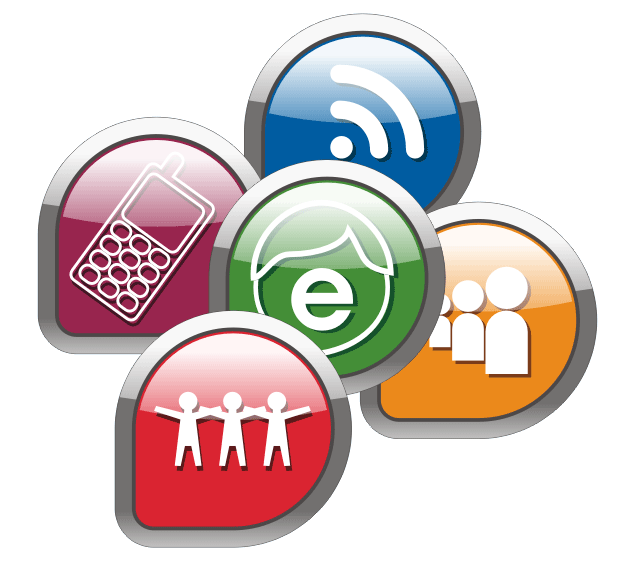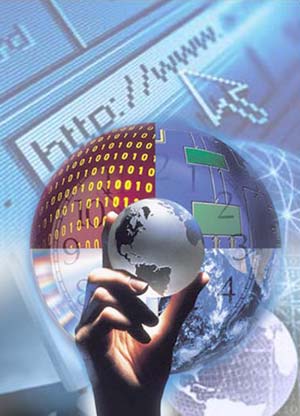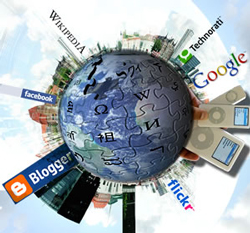|
eCitizen and services
offered by GMTII
 By definition, electronic citizen is an individual who has the ability to use online e-services in a favorable level. In fact electronic citizens are the users of information society. In modern life, because of the multiplicity of the duties of citizens, each person has different needs and tasks and to satisfy many of his needs, he is forced to use easy and less costly methods. Electronic solutions that are generally offered under the Internet in our country, are one of the alternative ways of doing the everyday activities such as paying bills, banking, accreditation, buying and selling, education and … By definition, electronic citizen is an individual who has the ability to use online e-services in a favorable level. In fact electronic citizens are the users of information society. In modern life, because of the multiplicity of the duties of citizens, each person has different needs and tasks and to satisfy many of his needs, he is forced to use easy and less costly methods. Electronic solutions that are generally offered under the Internet in our country, are one of the alternative ways of doing the everyday activities such as paying bills, banking, accreditation, buying and selling, education and …
For example, an employee has different tasks in his business communications and marriage. In office he needs to archive and track the letters and perform other duties but in personal life he has some other tasks like buying furniture, monitoring children’s progress, raising children and many others .
Most of these activities can be done using electronic services. For example, instead of going to the market and spending a lot of time to select and purchase a product, one can save time by searching on the internet and then buying in the net using his credit card. Due to ease of searching on the internet he cans largely make sure of a proper purchase. Also in children’s education supervision, parents can be informed of the latest status of their children by visiting the school’s web site or even discuss some cases with teachers in a forum.
Due to the extent of electronic services which can be offered, each category usually has a separate name. Some of these categories are: E-commerce, E-banking, E-government, E-learning, E-health, electronic publishing, electronic election and many others.
A citizen who can use the whole or majority of the above categories to satisfy his needs is called an electronic citizen. So in order to fully realize the e-citizen in the country, development of every single infrastructure including e-banking, e-learning and the other electronic services is of great importance.
eCitizen status in USA
According to information provided on the pew Internet web site, the number of visitors to the America’s web sites which offer government services has significantly increased. 60% of government web sites have stated that they have developed the amount of their government services. In the United States an e-citizen uses the e-government to find the required rules, send his comments to the authorities and responsible agencies in order to contribute to the national policy decisions and other related functions. Functions related to the environment, education and health are respectively at the forefront of e-services offered in this country.
eCitizen status in Europe
In the 5-year plan which Europe Union has codified for electronic urbanization development, it is stated that all of European citizens and even the disabled will be able to use the e-government services using modern information communication technology before 2010. In this plan, practical solutions like micro codes, budgets, and trainings are considered in addition to the objectives and perspectives. For example, in addition to the above targeting, New Zealand government has stated that the employment type of staff and the related organizations’ tasks must change before 2020 due to the increasing opportunities that Internet and networking technologies will provide. England as one of the pioneers of electronic citizenship development has reached great achievements so that this country has offered hundreds of its services electronically.
Current status of Iranian eCitizens

In 2007, 53.7% of total Middle Eastern users are dedicated to Iran with 18,000,000 internet users, but the question is what percentage of these users has the potential ability to use the eCitizen functions? To put it simply what percentage of them can be called eCitizen? In IRAN, using the chat softwares like yahoo messenger are very popular. In a field research which has been conducted among the Iranian students it is known that 74% of the time students spend on the internet is dedicated to using the software and internet dating sites.
In IRAN in lots of sections, required functions in the fields of e-commerce, e-government, e-learning and … are identified and created, so using current national information technology infrastructure and also technical, legal, cultural, economic infrastructures, they could be somewhat implemented. This problem exists in lots of countries more or less.
We should also consider that some of the purposes which have been created so far are not compatible with the usability principle and in fact they don’t lessen the burden on users. Anyway, current internet users in IRAN don’t encounter much online services and naturally they haven’t learnt how to use these services, so we can’t call them eCitizens.
On the other hand when we look at the usable purposes which have been created in IRAN, we realize that these users have learnt how to use these applications very fast and are using them pervasively. This indicates that we have definitely a very high potential, if we accelerate our actions in creating infrastructures and purposes.
Another major problem in eCitizen in IRAN, is the lack of access to the internet with a good speed. Unfortunately in many purposes especially the ones that require users to download or upload a huge amount of data, user prefers the traditional methods because of slow connection and high costs. Also lack of familiarity of the public especially those who are more active in community with computers and the inaccessibility of the internet in times of emergency contributes to the problems of eCitizen development.
Major benefits of eCitizen implementation in IRAN are social justice increase, reduction in bank visits, removing restrictions on the educational environment especially in higher levels of education considering the multiplicity of the applicants, reduction in traffic in metropolis, reduction in fuel consumption, reduction in trips within the urban and suburban, efficiency increase, substantial reduction in labor costs, reduction in client’s visits to the offices, reduction of the possibility of receiving and paying bribes, correct ,rapid and timely information, culture and arts development, client’s satisfaction, reduction in governmental costs and the possibility of getting the correct tax.
Mobile ICT Devices, best instruments for eCitizens.
Since inventing the first computers, there have been dramatic changes in design, volume, price and performance of computers, especially personal computers. Computers are becoming more powerful and less costly but, the interesting thing is the advent of other electronic tools especially Mobile ICT devices like Tablets, Smart phones and Cell phones with similar performance in this field. Widespread use of cell phones has made cell phones to the most popular electronic device in the world. Also today’s cell phones have most of personal computers capabilities moreover; the major advantage of cell phones over personal computers is their permanent availability, easy use, more compatibility with the environment, being cheaper than personal computers especially laptops and ability to establish an easy and permanent connection to the outside world. All these have made the cell phones to be more appropriate tools for eCitizens but, the major problem is the insufficient mobile applications for eCitizen purposes and also the difficulty of transferring a mobile application which is usually a Java application to the citizens’ cell phones. Luckily in our country, along with the developed countries, there exist companies that are able to offer programming services on cell phones and also some inventions and products related to sending and receiving information to cell phones within the country in industrial scale. Also MCI (GSM operator) & Irancell (GSM operator) has started to provide GPRS service and they provide EDGE in some areas. It is supposed to perfurm 3G to Iranians very soon. If this service is provided, Internet will be accessible through cell phones for the public.
It’s worth mentioning that Iranian experts in GMTII have offered a solution for the above problems. Even in the absence of GPRS service, Bluetooth, the masterpiece of digital communication, can be in charge of a large volume of tasks using a different approach. The biggest advantage of Bluetooth over GPRS is that using Bluetooth for send and receive is free and that’s why Bluetooth is in charge of a large volume of eCitizen functions in developed countries.
As it was mentioned before, there are 18 million internet users but, the point is there are almost 28 million cell phone users in our country from which 24 518 000 are MCI users who will have the possibility of using Internet through GPRS soon.
There are also 3 million Irancell users who are currently able to use GPRS, and finally the remaining 720000 users are TALIA (operator) users who are deprived of GPRS service. But the remarkable thing is that GPRS is not the only means of the digital connection establishment and Bluetooth has relatively more advantages over GPRS which cannot be ignored even in the presence of GPRS.
In eCitizen functions on cell phones there are lots of details which are beyond this paper. God willing, we will discuss this topic even more in next papers and we’ll attempt to discuss eCitizen in its subsets like e-government, e-police, e-learning and … on both cell phones and personal computers.
What is an electronic city?
An electronic city is in fact a virtual electronic model of the activities in the city with the same relations, functions, complexities and problems. In this city, in its ideal form individuals must be able to handle all their affairs anytime and anywhere with the best quality. Citizens in offices, homes and even in travel are able to pursue their own affairs easily and without having to visit anybody.
In this system citizens have the equal facilities for doing their affairs and unlike current structure in which people lose the possibility of having the equal chance for various reasons like long distance to service centers, limitation of working hours and … there will be more social justice. This problem has resulted in population density in some parts of the cities or some cities. In an electronic city, citizens receive the services easily and with very little time and expense. The first step in getting to this ideal city is the government’s determination and the citizens’ to achieve this goal. Also coordination between government’s different sections to join this stream is very important. Using all reliable and useful web sites, based on global standards to offer governmental services is one of the most important steps in facilitating the users’ actions and the underlies the development of e-cities. In these cities web sites and portals are practically a place for interaction between citizens and service providers and individuals are in direct and constant contact with this tool. If this tool is not available for every single of citizens, the e-citizen and e-government concept will be a dead-end discussion. The next important issue is the explanation of offered services and developing a long-term plan for changing the type of interactions between citizens and organizations and government. Both organizations and citizens must have sufficient capability and time for this change. These alterations shouldn’t be done hastily and without considering possible challenges and opportunities, because these alterations and substitutions will confuse the citizens and organizations’ staff and distrust to the services. The trend of this movement toward electronics should be based on a sensible timetable and according to other issues like culture building and education.

Based on its precious experience in various fields of research on e-citizen in our country, GMTII is ready to offer consulting services to all governmental and non-governmental sectors
What institutions are the main custodians of the eCitizen?
Internet and other new communication tools have developed new methods in modern life. Using on-line services results in lots of benefits such as reduction in air pollution, traffic reduction, reduction in fuel consumption,cost reduction, acceleration in tasks and several other benefits. Development of e-citizen functions provides new opportunities for the community. For example, the words “Home Office” or “Work @ Home” in the electronic world of today with the new tools of communications have acquired new meanings. Home has always been a place of comfort and leisure however, today with all the technology, for many businesses it has become a workplace in addition to being a place of comfort.
Governments are the main custodians of the eCitizen in the world, that’s because eCitizen implementation requires proper technologic and legal infrastructures. In our country, considering the system, it seems that all powers including the executive, legislature and judiciary has separate functions in appropriate implementation of eCitizen in our country.
Executive branch has the major role in establishment of electronic system in the country with implementing the appropriate technological infrastructures.
Also according to duties stipulated in the constitution, it is concluded that executive branch is in charge of implementation of e-government subset.
Furthermore the divestiture of governmental duties to the private sector in this area can be an effective step in achieving the goals and policies of article 44 of the constitution which was notified by supreme leader. The legislative branch is in charge of appropriate legislation and also investigating of possible crimes, therefore there are some offices investigating the electronic crimes.
Since “eCitizen” is derived from city and citizen, it is closely related to the municipalities so municipalities have a significant role in this issue. eCitizen must be able to deal with these issues and to help improve his life and community.
How municipalities can be effective for operating of eCitizen?
Municipality as an organization that has the most contact with people’s everyday life plays a major role in this issue. Dealing with the online services and the eCitizen topic will greatly reduce the burden of municipal responsibilities. For example for years it has been tried to build appropriate streets and buildings for the physically disabled. The eCitizen topic could be really helpful for these community groups. Today in cities due to the structure and layout and construction issues, people with low physical ability and the disabled don’t seem to have an equal chance for receiving services, however in electronic cities these community groups will be able to use all services in an optimum level with no need to use advanced and special movement tools. While currently in some organizations there is no easy way for citizens with low physical ability because of non-compliance with building standards and it bothers people to go up several steps to track a letter, in an electronic city with all electronic box offices, individuals can do the same thing within minutes and without any effort just with pressing some buttons.
Municipalities as organizations that offer the most services to the citizens can make effective steps in developing electronic cities and eCitizens and also encouraging others to offer and use online services by electronic services.
Factors that can be effective in eCitizen improvement
Iran’s population is young and relatively educated and intelligent so we have a high potential in eCitizen in fact it’s one of our strengths within the Middle East and perhaps the world.
The most important issue in eCitizen is culture building and encouraging citizens to use online services that are offered by the government and other organizations. Training of citizens including government employees, students and others will promote a culture of using online services. These trainings could start from primary schools and continue to higher education levels in order to train experts and include short-time training, long-time training, indirect training or even training in specific applications. These trainings should be given by professionals to achieve the specified targets. Basic computer trainings could not cause people to move in this direction but these trainings should be specifically toward the use of online services. Another important issue that can be helpful is teaching people how to actually use the services instead of just keep informing people that these services exist. Unfortunately so far except for a few cases we have just tried to inform people of services which is not sufficient for encouraging citizens to use these services. For example in television advertisements the existence of an electronic service is frequently mentioned but usually the way of using this service is not expressed anywhere in the television or elsewhere.
The more important issue to promote eCitizen is the fact that a company cannot claim to be electronic just because it has developed a website and is offering services to its clients. Unfortunately except for banks (even banks cannot claim that they have managed to set up a mobile electronic banking system or mobile banking) other organizations in our country are offering e-services just by internet while most predictions reach the conclusion that in the future cell phones will overtake the personal computers. Considering the various media for offering e-services in order to create a real electronic community is one of the requirements that should be discussed more.
|



